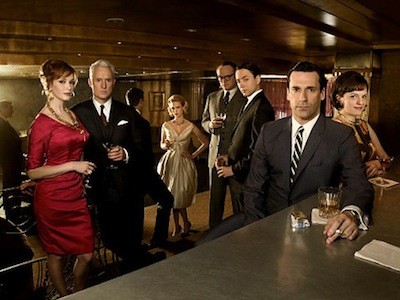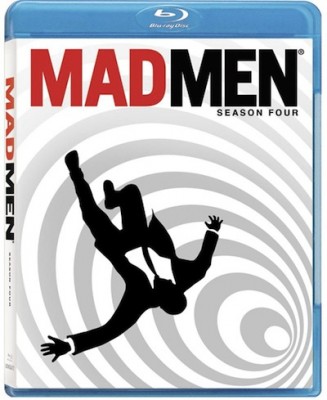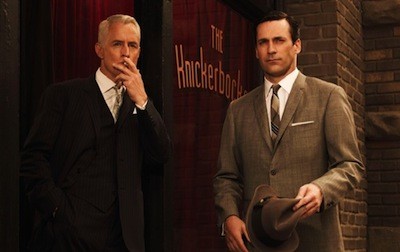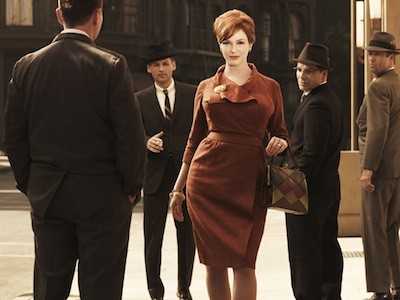| Reviews & Columns |
|
Reviews DVD TV on DVD Blu-ray 4K UHD International DVDs In Theaters Reviews by Studio Video Games Features Collector Series DVDs Easter Egg Database Interviews DVD Talk Radio Feature Articles Columns Anime Talk DVD Savant Horror DVDs The M.O.D. Squad Art House HD Talk Silent DVD
|
DVD Talk Forum |
|
|
| Resources |
|
DVD Price Search Customer Service #'s RCE Info Links |
|
Columns
|
|
|
Mad Men: Season Four
THE SHOW:
"We'll have to smoke the dress."

Things have changed a whole lot since the last time we were on Madison Avenue.
At the end of the third season of Mad Men, the status quo had been thoroughly demolished. Sterling Cooper was being swallowed whole by its British owners, Don Draper had revealed his secret identity to his wife, and the remnants of the once thriving ad agency were striking out on their own.
Season 4 of television's best series opens after some time has passed. 1964 is on its way out, and the upstart Sterling Cooper Draper Pryce has had some real success with Don's innovative television commercial advertising floor wax. Things are definitely looking up...though in show creator Matthew Weiner's world, that means everything is about to get a whole lot worse.
Assessing Mad Men as a series has always meant tackling its two main facets. On one hand, it's a brilliant ensemble piece, following the professional lives of the executives and employees at the 1960s ad agency, as well as some of their personal travails outside the office walls. On the other hand, it is the story of Don Draper, the enigmatic and creative center around which everyone else revolves. Played by the classically handsome Jon Hamm, Don Draper is that old cliché: a man every woman wants to have and whom every man wants to be--and this despite some rather unsavory personality traits. Don is at best mercurial, at worst a liar. He is a drunk and a philanderer.
Don is also a man caught in a changing world, who is attempting to maintain his personal standard of living while also going along with the social evolution that is occurring all around him. At its most fundamental, this is what Mad Men is really about: America's transition from post-World War II illusions into the more open (or possibly more delusional, depending on your perspective) and more progressive 1960s. This transformation is affecting both sides of the generation gap. The elder statesmen at the top of the advertising food change are becoming dinosaurs, but they are still in charge; their younger employees are caught between wanting to be their mentors and needing to grow beyond them. It's not going to be an easy transition for any of them. It doesn't matter who you are, life is still going to get in the way.
By the start of Season 4, Don has gone through a lot of personal change. His marriage to Betty (January Jones) is over, and she has remarried. Betty and her new husband (Christopher Stanley) live with the kids in their old house, and Don has an apartment in the city. Don is riding a creative high, but the spotlight has never been his forte--a plot point expertly handled in the season premiere, though its bold-as-brass raised-eyebrow of an ending is a bit of a dodge. Don's going on one big emotional ride this year. He'll drink more, have a bedroom-related mishap or two, lose someone, get sober, get in a relationship...and well, without saying too much, Don ends up being the same old Don. Despite all the time spent wrestling with his demons, despite all the harsh confrontations of the soul, Don Draper can only be Don Draper. The end of Season 4 was hotly debated because of this. Some fans of Mad Men have a yearning for their guy to be better than he is and forget that his most-often recurring trait is taking rash action.
Part of what makes Mad Men so rewarding is how differently things play on repeat viewings. There is a lot of foreshadowing and intentional connections that aren't always apparent the first time around, particularly when you are watching the shows as they air. The weekly gap can also cause a gap in memory, an important detail might fade. I was surprised on watching the shows again the season climax is actually called out in Episode 2. Listen to what Dr. Miller (Cara Buono) has to say to Don at the Christmas Party, and then keep in mind what Don does almost immediately after: they told you what was coming, you just didn't know it was foreshadowing at the time.
Peggy Olsen (Elisabeth Moss) also has an important year this time around, and since she has always kind of been Don's protégé, her storyline gets a lot of attention. As the youngest copywriter in the office, she is the one caught straddling the divide most often. The rest of her generation is in the midst of dismantling all manner of injustice and oppressive traditions, and in a way, Peggy is working for the other side. As feminism takes root, she must reconcile self-preservation with the larger issues at hand. Here again there are echoes and callbacks throughout the season. Her reaction to Don's secretary in Episode 4 is disappointing, and karma has it's punishments. Peggy gets a dressing down from Joan in Episode 8 that is almost exactly the same--though eventually Joan, Peggy, and Dr. Miller do find more common ground, even if it isn't the happiest.

This dynamic between the characters is a lot of what makes Mad Men tick, and trying to single out specific instances where important pairings have significant scenes in Season 4 can get difficult. How do you choose between, say, the flare-up of old feelings between Joan Harris (the divine Christina Hendricks) and Roger Sterling (a dashing John Slattery) in Episode 9, and the New Year's Eve adventures of Don and Lane Pryce (Jared Harris cutting loose)? Both sequences say so much about these characters, but Mad Men is also a show that doesn't do anything lightly. Every scene, every line of dialogue, is significant. It's becoming an old saw that a good season of a television show is like reading a big chunk of an ongoing novel, but that is an unavoidable comparison in a show as richly developed as Mad Men. Themes expand and reoccur, metaphors take on added significance, and there is an overriding sense that this is all going somewhere.
That said, for most viewers, the stand-out episode of Mad Men: Season Four is the one at the eye of this particular storm: Episode 7, "The Suitcase." This is essentially a Don and Peggy episode. Knowing that bad news is coming, Don forces Peggy to pull an all-nighter with him, ruining an event with her current boyfriend and bringing the issues between them to a rise. What begins as a contentious evening eventually turns into a night where secrets are shared, battlegrounds are traversed, and past mistakes unexpectedly come crashing in. (Duck Season!) It's an episode where the two people we are most focused on have to get real about who they are and where they are coming from, and while we can't be sure what long-terms effects this will have--especially as it is Don's rock bottom and he is about to start climbing out of it--the resonance of this watershed will be felt until the series end (it is the exact middle episode of this cycle, so in a way, Season 4's fulcrum). It also gives both Hamm and Moss some of their finest moments in the series so far. Both are wonderful actors, and in ongoing roles like these, it's easy to take for granted how good they are. Just as there is no way to adequately sum up the characters in a couple of lines, there is also no way to quickly categorize the work being done by these actors. They work through just about every emotion in this episode--anger, conciliation, embarrassment, tenderness, grief--and they hit each mark with absolute precision.
Then again, this is another area where it is so hard to praise any one cast member over another. For as cool as John Slattery gets to be most of the time, he also gets to be vulnerable, be it having his heart broken by his failures with Joan or having his ego smashed by the head honcho from Lucky Strike. The cruelty Roger is subjected to at the Christmas party is only the beginning of how Lucky Strike will leave him twisting this season. We are essentially watching an old lion fall on his own hunting ground. (Side note: Slattery directs two episodes this season and does an excellent job of it.)
Christina Hendricks is also always amazing, balancing Joan's need to be in control with the giant heart she tries to bury. Her fury at Lane for his ill-timed comments is as potent as her anger with the office boy who thinks he can humiliate her; however, nothing is as disarming as when she cuts herself while making dinner for her husband and completely breaks down. Hendricks doesn't just bring to bear the hurt of the moment, but the full weight of everything that is troubling Joan is unleashed in one great sob. It's heartbreaking. Elsewhere, Vincent Kartheiser continues to settle into his role as Pete, adding strength to the mealy-mouthed character bit by bit, and Jared Harris probably doesn't get enough credit as the embattled Lane and Rich Sommer deserves notice for the subtle touches of comedy he injects into his scenes. (Look at him take all those cookies at the staff meeting!)
When it comes down to it, Mad Men works so well because of how the writers tackle a particular subject--be it a plot point or a person or a real-life development injected into the storyline--and examine it from every angle. A show of this kind is expected to take the side of the counterculture, for instance, since that is the romantic take on the 1960s. Yet, when Peggy meets up with a couple of radicalized artists at a simulacrum of Warhol's Factory, they are shown to be as judgmental and prejudiced as the old guard. They are just as unfair and mean-spirited toward the firm's receptionist (Jessica Paré), treating her as an object of ridicule, as they would likely accuse Middle America--or even Don Draper--as being toward them. It's actually a perception that Don has been contending with since the first season, and those who remember his first mistress, bohemian artist Midge (Rosemarie DeWitt), will be happy to see her return in Season 4's penultimate episode, but sad to see how her own "alternative" lifestyle has yielded terrible consequences.
This attention to character detail is just another facet of the overall attention Matthew Weiner and his staff pay to the time period. Appropriate details and cultural references are woven into each show, and the further we get into it, the more elegant the technique. Be it a Stan Freberg quote or a Godzilla movie or references to Malcolm X, these careful touches give an added dimension to Mad Men. Whole blogs are devoted to dissecting what the writers are drawing on, be it the painting in the diner where Don and Peggy share dinner or the writing of John Cheever. The art directors, costume designers, and set decorators also deserve special mention. They are rigorous in their efforts, and their work is essential to the show. Without them, we couldn't believe we are really watching people living in the 1960s, but when they are doing their best work, they are, essentially, background, and thus easy to take for granted. (Oh, and the music is always great. I had a good time tracking down the different songs used this year to make a playlist for a friend's season-finale soiree.)
I haven't really touched much on the storylines outside the office in Mad Man: Season 4. I know there are some out there who don't like the homelife plotlines as much as they do the work-related scenarios. I kind of get that, as I am obviously attracted more to the professional interactions and how that pushes out into the rest of life's activities, but I think it needs to be acknowledged that the outside material also pushes in. Sometimes indirectly (Joan's problems with her husband inspire her reactions to things at work; Pete's wife getting pregnant effects his relationship with Peggy), and sometimes directly (Sally Draper showing up at the office unannounced). People are often different at work than they are at home, and particularly in the 1960s, there was a dividing line between professional and personal. We see that a lot in how the men behave, and I think one of the less explored themes of the show is how the cultural metamorphosis is also erasing those lines. You can't be a different person every time you pass through a different door (Peggy, in particular, is experiencing this; the character of Paul Kinsey, who is off the map at this point, represented that in previous seasons.) There is also a lot of interesting stuff going on with Sally (played with a kind of fumbling earnestness by Kiernan Shipka) that touches on what it's like to grow up at this time in history, with a new influence of pop culture (that awkward "Man from U.N.C.L.E." occurrence), the growing acceptance of psychology, and the troubled dynamic between her and her mother, who herself hasn't really grown-up and yet still resents her daughter's youth.
With a cast this big there are a lot of stories to keep straight in a full sixteen-episode cycle, and yet Mad Men never loses track or gives short shrift. The plot develops naturally, and though some of the developments might shock and surprise, they all ultimately make sense within the integrity of the show. The 13th episode yet again closes the season with new questions and new possibilities, but that just means we aren't at the end yet...and so far, that's a very good thing. Matthew Weiner has promised us at least another year or two, and Sterling Cooper Draper Pryce haven't nearly worn out their welcome yet.

THE BD
Video:
Mad Men: Season Four hits Blu-Ray as an awesome 1080p widescreen transfer. The resolution is sharp as a razor and the rendering exquisite. Colors have the appropriate temperature and there is plenty of texture and skin tone to drool over. It's a wonderfully realized visual effort.
There are three discs, with five episodes on the first and four on the other two. You can play all of them in a row or pick and choose. Thankfully, "previously on" tags have been edited out, and you can toggle past the opening credits if you want.
Sound:
All 13 episodes are presented with a 5.1 DTS-HD Master Audio track. The audio is vibrant and textured, with good movement between the speakers and a good use of rear-channel ambience. The period music sounds killer, and the dialogue is mixed for easy hearing.
Subtitles are available in English and Spanish. There is also Closed Captioning available.
Extras:
The standard slimline BD case for Mad Men: Season Four has trays for all three discs and a paper insert that serves as an episode guide and also marks which extras are on which disc (though, no list of commentaries). At first I thought the cover art was a little lazy when I saw the image online, but the outer slipcase has lenticular printing so you can experience Don Draper's vertigo. The movement is limited, but still cool.
As is to be expected, the Blu-Ray is packed with audio commentaries, at least one per episode. They are as follows:
* Episode 1: Series-creator Matthew Weiner and lead actor Jon Hamm // Composer David Carbonara and costume designer Jane Bryant
* Episode 2: Weiner and episode director Michael Uppendahl // Actors Joel Murray (Freddy) and Alexa Alemanni (Don's secretary Allison)
* Episode 3: Weiner and episode director Jennifer Getzinger // Actors Melinda Page Hamilton (Anna, Don's friend in Los Angeles) and Jared Harris (Lane Pryce)
* Episode 4: Actors Vincent Kartheiser (Pete) and Cara Buono (Dr. Miller), and John Slattery, who plays Roger and who directed the episode // Weiner and cinematographer Chris Manley
* Episode 5: Weiner and episode writer Erin Levy
* Episode 6: Weiner, writer Brett Johnson, and director Scott Hornbacher // Actors Aaron Staton, Jay Ferguson, and Danny Strong (Ken Cosgrove, and new characters Stan and Danny)
* Episode 7: Elisabeth Moss (Peggy) // Weiner, Manley, and editor Tim Wilson
* Episode 8: Weiner and editor Leo Trombetta // Actors Christopher Stanley (Henry Francis), Matt Long (Joey), and Rich Sommer (Harry)
* Episode 9: Weiner and writer Dahvi Waller // Actors Buono, Christina Hendricks (Joan), and Kiernan Shipka
* Episode 10: Weiner and Carbonara // Kartheiser and Hendricks
* Episode 11: Weiner and Levy // Buono and Jessica Paré (Megan)
* Episode 12: Slattery, who directed, and writers Andre & Maria Jacquemetton
* Episode 13: Weiner with Paré and Shipka // Weiner and writer Jonathan Igla
This pretty much leaves no stone unturned in terms of talking about the various facets of the production. I find the tracks with the creative staff more interesting, particularly when it's the more technical jobs like music and cinematography. Matthew Weiner is always interesting and obviously has the most over-arching perspective on the show; the actor commentaries tend to be the most jovial, though you can likely gauge your interest on how interested you are based on the parts they play. Christina Hendricks is always good, she's so engaged in the show she brings the enthusiasm up. It's nice that they got Kiernan Shipka involved, too, but she's a little young to contribute too much. Most actors are chosen for an episode that has some significance for their role, so the Elisabeth Moss track is perfect for episode 7, "The Suitcase," though it's surprising to hear a performer going solo. Not having Hamm is a missed opportunity.
Outside of the audio commentaries, the Mad Men sets largely eschew the standard DVD extras, and for that, a round of applause. Haven't we all figured out how movies and television get made? Do we really need more "behind the scenes" apple polishing? The extras on Season Four instead offer interesting glimpses into different real-life developments from the show's intended time period, further informing the viewing experience.
Disc 1 has the 27-minute "Marketing the Mustang: An American Icon", a documentary about designing and selling the classic car. Disc 2, likely prompted by the Draper split, is the three-part "Divorce: Circa 1960s" (together about an hour and twenty minutes), a look at the shifting social mores and what it meant to get a divorce back then.
Disc 3 has two different pieces: "How to Succeed in Business Draper Style" (56 minutes), an analysis of Don Draper's plan for success by actual businessmen; and "1964 Presidential Campaign" (31 minutes) looks at how advertising helped Johnson defeat Goldwater. For those curious about these things, they actually show vintage television commercials, including the infamous clip of the little girl picking flowers before a nuclear holocaust.
The extras are in high-def.
FINAL THOUGHTS:
Plenty of words have been slung in celebration of Mad Men's greatness. There still haven't been enough. Season Four offers further growth, new surprises, and the same old attention to detail that has made this television show so fascinating. You won't like every decision the characters make, but you'll always be enthralled as they make them. The Blu-Ray presentation for Season Four matches the show's quality with technical wizardry--great picture, great sound, great extras. DVD Talk Collector Series.

Jamie S. Rich is a novelist and comic book writer. He is best known for his collaborations with Joelle Jones, including the hardboiled crime comic book You Have Killed Me, the challenging romance 12 Reasons Why I Love Her, and the 2007 prose novel Have You Seen the Horizon Lately?, for which Jones did the cover. All three were published by Oni Press. His most recent projects include the futuristic romance A Boy and a Girl with Natalie Nourigat; Archer Coe and the Thousand Natural Shocks, a loopy crime tale drawn by Dan Christensen; and the horror miniseries Madame Frankenstein, a collaboration with Megan Levens. Follow Rich's blog at Confessions123.com.
|
| Popular Reviews |
| Sponsored Links |
|
|
| Sponsored Links |
|
|
| Release List | Reviews | Shop | Newsletter | Forum | DVD Giveaways | Blu-Ray | Advertise |
|
Copyright 2024 DVDTalk.com All Rights Reserved. Legal Info, Privacy Policy, Terms of Use,
Manage Preferences,
Your Privacy Choices | |||||||












